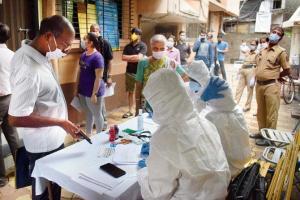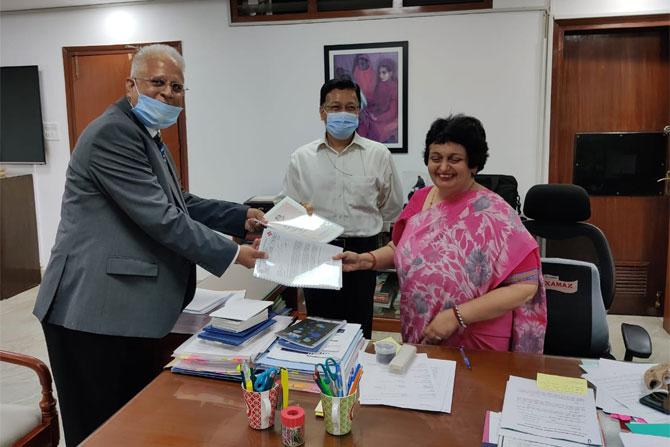It details the need for a separate cadre for administering and managing the healthcare services and public health in the country

BMC staff conduct swab tests at Dadar. Pic/Ashish Raje
The National Working Committee of the Indian Medical Association, formed to submit the recommendation for the formation of the Indian Medical Services (IMS), a separate cadre on the lines of the IAS,IPS, IFS and IRS, has submitted its 40-pages detailed report on Tuesday to the Association.
ADVERTISEMENT
The COVID-19 pandemic and numerous experiments with drugs have once again brought into focus the need for a dedicated IMS. mid-day has been writing about this: on July 15, 'Indian Medical Services needed to save 'crumbling health care system'' and July 8, 'Indian Medical services needed for administrative decisions of healthcare.'
A five-member team, under the chairmanship of Dr Vedprakash Mishra, national head of the Academic Programme (Indian Programme), UNESCO chair in BioEthics (Haifa), is working on the modulation of structure, operation and function of IMS constituted by Dr Rajan Sharma, national president, Indian Medical Association (IMA). The working group includes Dr Vinay Agarwal, former national president and member of IMA; Dr Shivkumar Utture, president, Maharashtra Medical Council (MMC) and Dr R V Asokan, secretary general, IMA HQ-Delhi. Dr S Arulrhaj, president, Association of Physicians of India and Dr A Marthanda Pillai, former national president, IMA, were invitees. They all met on Sunday (July 19) to finalise their recommendation.
 IMA President Dr Rajan Sharma meets Union Health Secretary
IMA President Dr Rajan Sharma meets Union Health Secretary
When asked to elaborate the need to have IMS, Dr Mishra said, "The health sector in our country, when compared in terms of the performance of Space Technology and Information Technology Sector, makes for a tragic story. For that matter even agriculture has not done well. Even today there are many villages where health care workers are not available."
Who is eligible for IMS
The entry to the Indian Medical Services will be exclusively allocated to those who possesses a minimum graduate qualification in modern medicine (MBBS) from a recognised medical college and examining university as per the report.
Experts speak
Dr Subhash Hira, professor of Global Health, University of Washington, USA and former technical advisor of Ministry of Health, New Delhi said, "I have heard that the empowered IMS committee of Indian Medical Association has finalised sending recommendation to the central government. This is a most welcome move and wish to congratulate the committee members for a job well done."
Dr Wiqar Shaikh, senior allergy and asthma specialist said, "The IMS requires the services of a minimum MBBS qualified person, this is because non-allopathic specialities may not be able to properly manage the huge allopathic speciality, whereas the other way round, the MBBS graduate would be able to provide adequate administration for non-allopathic specialities. It is therefore essential that the IMS should appoint only a MBBS graduate, although a post graduate medically qualified person would be more recommended."
Dr Ketan Vagholkar, professor of Surgery at DY Patil College said, "IMS eligibility should be a basic medical graduate (MBBS) with three years of work experience or successful completion of post graduation (MD/DNB). This will ensure that the person has knowledge of the system with respect to his functioning. And age should not be a criteria for eligibility to IMS services.
Dr Mishra added, "Although Sir John Bhore laid down the health policy way back in 1946 whereby the pre-care system of health delivery was recommended, the same came to be implemented in independent India throughout its length and breadth. The principles incorporated in Sir Bhore Committee stand diluted over the years in an incremental manner. The Doctor Population ratio still remains at 1:1445 whereas WHO has recommended it to be as 1:1000 population. There is a huge and remarkable skewed distribution of medical colleges in the country and also that of doctors and the para medical staff."
"The fund allocation as such for health sector, which ought to have been at least 5% of the GDP, is still a far cry and is as low as 1.2% of the GDP as of now. The added tragedy is that even the allotted funds are not optimally utilised and moreover don't end up accruing planned and desired benefits to the targeted beneficiaries which ends up in defeating the cause," he added.
Areas covered in the report
Nomenclature
The nomenclature of the services should be 'Indian Medical Services', so as to be in tune with the very nomenclature that has a great grand legacy of well over three centuries of effective, meaningful and laudable services to the cause of public interest in the domain of effective and meaningful healthcare delivery system. In the teeth of the material fact that 'Right to Health' turns out to be a fundamental right accruable to every citizen of India independent of any differentiation or demarcation of any type in terms of guarantee emanating out of Article 21 of the Constitution of India and the legitimate fulfilment of the said guaranteed right without any breach of any type stands warranted as the most desired modality for actualization of the 'Welfare State' enshrined and contemplated in the Constitution of India as its core objective.
Scope
The scope of the Indian Medical Services which would be a cadre under the umbrella rubric of Union Public Services in terms of their origin from All India Services Act, 1951 needs to be viewed in the context of material realities, including:
1. Public health management means not only addressing preventive and promotive measures of health, but also organising of Primary, Secondary and Tertiary healthcare services as an integral part of crystallized healthcare delivery system. This, in turn, needs expertise in all key health systems components including human resources for health, community participation, health informatics, management approaches, suited technology for the health governance and management, financing of healthcare in the domain of health economics, demographics and above all it also needs a sound ingraining in epidemiology, as well as surveillance.
2. There is a myth that doctors as professionals are poor managers. However, the runaway success of doctors as leaders in private healthcare industry belies such a generalised and simplistic conclusion.
3. Doctors in Health Services are recruited and trained to play entirely different roles than what is required for health administrators and policy makers.
4. As of now it is vividly seen that there is a palpable technical gap between planning, and execution, in as much as that the personnel in the administrative cadre may be a good administrator, but necessarily may not understand the intricacies of the healthcare sector. Similarly, a doctor may be excellent in his clinical practice, but may not be as good as an administrator. This gap is bridgeable in terms of creation of a specialised breed of administrators that would cater to better management and administration of healthcare systems including the public health in the country as a whole.
5. The core scope of the Indian Medical Services therefore, would invariably be to create a specialised breed of administrators who would undertake better management of healthcare system including public health with ease, elegance and desired innovation in larger public interest as a part of cadre under All India Civil Services christened as 'Indian Medical Services'.
Relevance
The relevance of All India Services continues to be viewed in the context of material facts that include:
1. The All India Services continue to be one of the premier institutions to uphold the unity of the country as a whole.
2. The members of the All India Services have lived up to the vision as envisaged by the framers of the Constitution of India.
3. The All India Services ensure integrity, cohesion, efficiency and coordination with administration of the country. The common recruitment and training ensures uniform standard of administration in the States and Union Territories as well.
4. The availability of experience gained in different parts of the country turns out to be an asset in itself.
5. An 'Espirit De Corps' inter-alia professional fellow feeling develops amongst fellow professional members.
6. The required and sought after staff support comes through permissible 'Lateral entry'
7. The effective leadership stands acquire through placements Right from Sub-Divisional/District, provincial, up to central level that would smoothen the core dispensation of healthcare delivery system.
8. The varied administrative experience blended with professional medical skills including in the domain of public health, would augur well for the incumbents to discharge their duties and responsibilities with precision and optimal perfection.
9. It would add to the qualitative improvement in medical and health services including public health in the country.
10. The National Health Programme Scheme and projects thereto would get better implemented yielding optimal public benefits.
11. The union Government and also the State Governments including those of Union Territories would get wide scope for selecting suitable Officers for manning the administrative posts.
12. The Union as well as the State Governments and those of Union Territories would stand to mutual benefit due to rich experiences gained by the personnel under the Indian Medical Services postings.
13. It would cater to National integration and provide a bull work against the forces of disruption parochialism and regionalism.
14. It would serve as a strong catalytic agent for realization of core guarantee of Right to Health to all the citizens guaranteed under Article 21 of the Constitution of India and also the universal goal health equitably and affordably.
Structure
The structure of the Indian Medical Services would be in the form of a cadre specialised in character for the dispensation of healthcare services including those in the domain of public health, excluding the domain of medical education in its entirety.
Operations
The operations of the Indian Medical Services would be akin to and on par with those as applicable to Indian Administrative Services with reference to terms, service conditions, postings, modality of recruitment, allotment of cadre and other cogent correlates.
Catch up on all the latest Mumbai news, crime news, current affairs, and a complete guide from food to things to do and events across Mumbai. Also download the new mid-day Android and iOS apps to get latest updates.
Mid-Day is now on Telegram. Click here to join our channel (@middayinfomedialtd) and stay updated with the latest news
 Subscribe today by clicking the link and stay updated with the latest news!" Click here!
Subscribe today by clicking the link and stay updated with the latest news!" Click here!






